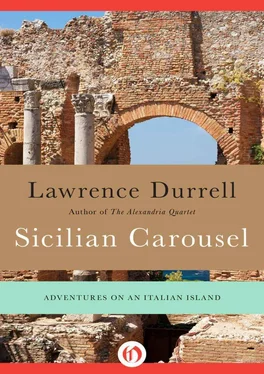Lawrence Durrell - Sicilian Carousel - Adventures on an Italian Island
Здесь есть возможность читать онлайн «Lawrence Durrell - Sicilian Carousel - Adventures on an Italian Island» весь текст электронной книги совершенно бесплатно (целиком полную версию без сокращений). В некоторых случаях можно слушать аудио, скачать через торрент в формате fb2 и присутствует краткое содержание. Год выпуска: 2012, Издательство: Open Road Media, Жанр: Путешествия и география, на английском языке. Описание произведения, (предисловие) а так же отзывы посетителей доступны на портале библиотеки ЛибКат.
- Название:Sicilian Carousel: Adventures on an Italian Island
- Автор:
- Издательство:Open Road Media
- Жанр:
- Год:2012
- ISBN:нет данных
- Рейтинг книги:4 / 5. Голосов: 1
-
Избранное:Добавить в избранное
- Отзывы:
-
Ваша оценка:
- 80
- 1
- 2
- 3
- 4
- 5
Sicilian Carousel: Adventures on an Italian Island: краткое содержание, описание и аннотация
Предлагаем к чтению аннотацию, описание, краткое содержание или предисловие (зависит от того, что написал сам автор книги «Sicilian Carousel: Adventures on an Italian Island»). Если вы не нашли необходимую информацию о книге — напишите в комментариях, мы постараемся отыскать её.
Sicilian Carousel: Adventures on an Italian Island — читать онлайн бесплатно полную книгу (весь текст) целиком
Ниже представлен текст книги, разбитый по страницам. Система сохранения места последней прочитанной страницы, позволяет с удобством читать онлайн бесплатно книгу «Sicilian Carousel: Adventures on an Italian Island», без необходимости каждый раз заново искать на чём Вы остановились. Поставьте закладку, и сможете в любой момент перейти на страницу, на которой закончили чтение.
Интервал:
Закладка:
Yet in spite of this rational disposition the visions kept intervening — Nature kept unfolding itself before his eyes, delivering its secrets to his curious and poetic mind. By some strange alchemy, too, he somehow managed to include a purely Orphic notion about the transmigration of souls into his system, where it sits somehow awkwardly. But so much of his work is missing that it is really a miracle that the extant remnants present as coherent a view of things as they do. It is rather like trying to reassemble a beautiful vase from a few recovered bits and pieces of it — the task which faces the archaeologist. Inevitably there will be here and there a shard which does not fit. In the case of this great man I was always struck by the fact that he felt that he himself had forfeited the final happiness; he describes himself as an “exile from a possible Bliss,” because he had put his trust in “senseless strife.” Was there any way to escape from such spiritual contamination? Apparently there was — by fasting, abstention from animal flesh, and the performance of certain mystical rites….
For him also the first completely realized forms to grow on earth were trees in whom male and female sexuality were so perfectly conjoined. And so on. Apparently the intoxication of these high thoughts was matched by a brilliant fuliginous style which made Aristotle christen him the first of rhetoricians or the father of rhetoric.
Yes, it is not hard to see why the notions of magic, of necromancy, clung to the name of old Empedocles — one thinks of his final leap into the maw of Etna. A suitable way for a great magician to take his leave of his fellow Sicilians. But the truth appears to be that he actually died far away, in the Peloponnesus. He must have been a very dramatic figure, this great rhetor, poet, visionary. In my mind’s eye I see always someone of the aspect of the modern Greek poet Sikelianos, who so charmed and bewildered us all with his strange mixture of greatness and histrionic absurdity. He became as much beloved for his aberrations and exaggerations as for his truly great verse which he insisted on declaiming at gale force and with gestures — which so often all but disguised its real merits. He too chose “big” subjects like his contemporary Kazantzakis — St. Paul, Buddha, Socrates.… They were grist to his poetic mill. I remember how Martine used to adore anecdotes about the Greek poets of our time — she was fully aware of their European stature in a period when Greece had yet to find its immortal echo outside Athens and Alexandria. Sikelianos at that time was already a walking reincarnation of an ancient God. He had founded the Delphic festival not as a piece of tourist folklore but, in true Empedoclean fashion, because he believed that the spirit of place was ever present, and that Delphi despite its silenced shrine of the Pythea was still pregnant with life. The meeting of great European minds at this sacred spot could have an incalculable effect on the poetic destiny of Europe — so he thought. He did not lack detractors, as may be imagined; but the incontestable greatness of his poetry silenced them. But sometimes he got so carried away by his vatic role that people thought of him as a mountebank. Yet the peasants at Delphi saw him as a sort of magician of today.
He was a strange mixture of vagueness and gentleness; and his great unassuming physical beauty made one sit up, as if in the presence of the Marashi. Nor was he foreign to the most endearing absurdities. One hopes that there will soon be a biography to enshrine the many anecdotes born of his flamboyant life and thought. One that Martine particularly enjoyed was concerned with death, for old Sikelianos believed so firmly in the absoluteness of poetic power that he went so far as to declare that a great poet could do anything, even bring a dead man to life by the power of his mind and vision. He was rather belaboring this theme while sitting in a little taverna, having dinner with Kazantzakis and, I think, Seferis, when the waiter, who had been listening to him with sardonic disgust stepped forward and informed him that someone had just died on the second floor, and if he wished to prove his point he had a subject right under his hand. Everyone smiled at this but Sikelianos appeared enchanted with the chance to show, not his own greatness, for he was a modest man, but the greatness which resides in poetry. Moreover, he believed in what he said, he could bring the dead man back to life as he had promised. They did not ask how he proposed to do such a thing. But anyway, the poet rose and asked to be taken to the room where the corpse lay. In a resigned mood the others continued their dinner; they were not entirely unconvinced that the old poet might, by some feat of magic, actually be as good as his word and make the dead man breathe again. But he was a long time gone. They listened but there was no sound of poetic declamation. He must have chosen some other method of raising the dead. Well, after quite a time a crestfallen Sikelianos made his appearance once more, deeply disappointed. Pouring himself a glass of wine he said: “Never have I seen such sheer obstinacy!” He was very sad about the failure of the Muse to come to his aid. This was the delightful man whom once Seferis brought to meet me — indeed it was to chide me for a bad translation of one of his great poems. I was terrified, but he rapidly put me at my ease by his gentleness. He had just come from the doctor where he had been informed that he was in danger of a thrombosis. A vein in the brain.… But far from being despondent he was wild with elation. “Think of it,” he said to Seferis, “a little gleaming swelling in there, shining like a ruby!” And he placed his long index finger upon the supposed place in his skull where the swollen vein was situated. He should have disappeared into Etna like Empedocles, or have been found half eaten by the Minotaur in Crete, or suffocated by the Pythean fumes at Delphi. But his death was the more tragic for being so banal. He suffered from a chronic sore throat and to soothe it drank quantities of a glycerin mixture the name of which differed by one letter from that of Lysol. He sent a boy out to the pharmacy for a bottle of his medicine and by a tragic mishearing the boy bought instead a bottle of the poisonous detergent. Without thinking the poet raised the bottle as he had always done with his throat mixture and half drained it before he realized the full horror of what he had done. By then it was too late.
I could not sleep, with all these thoughts fluttering about in my mind. I lay for a while on the balcony quietly breathing in the warm unmoving night air; it was strangely light, too, as if from somewhere offstage there was a bronze moon filtering its light through the vapors of the night. But before I realized it the dawn had suddenly started to come up, the distant sea lines to separate from the earth like yolk from white of the cosmic egg. The hills with their soft chalk tones rose slowly, tier upon tier, to where the city stood once more revealed with its two baleful skyscrapers. But an infinity of pink and fawn light softened every outline; even the huge boxlike structures looked well. I slipped down and coaxed the night porter to open the changing room door; the pool was delicious, not a tremor of coolness. I was swimming in something the temperature of mammals’ blood.
Yes, Sikelianos belonged to that old assured classical world where only great men wrote great poetry — there was an assumed connection between the power to write and orate great verse and the power to be morally and psychically superior to one’s fellow men. Greatness, though thrust upon one by the Muse, did not absolve one from being a great example to one’s fellows. An epic grandeur of style was believed to match an epic grandeur of insight and thought. They were another race these men — they were bards, whose sensibilities worked in every register, from uplift to outrage. The poet was not cursed, but blessed in his insight; and his themes must be equal to his mighty line. It is probably a fallacy to imagine that with the Symbolistes, with Baudelaire, there comes a break and the poet becomes a passive object of suffering, a sick man, a morally defective man like Rimbaud, like Leopardi. His work comes out of sickness rather than an over plus of health. Swinburne, Verlaine.… No, this is donnish thinking, for Sikelianos existed side by side with Cavafy, just as Mistral lived in the epoch of Apollinaire. But we should avoid these neat ruled lines between men and periods. The distances are much vaster than that and the poetic constellations move much more slowly across the sky. I betook myself to the coffee room where the majority of my fellow travelers were hard at work on breakfast, and where Deeds had emerged in some magical fashion with a brand new Times . This always made him vague, and over his coffee he was repeating “Sixty-three for five — I can’t believe it.” It seemed that a disaster had overtaken Yorkshire, and that Hampshire….
Читать дальшеИнтервал:
Закладка:
Похожие книги на «Sicilian Carousel: Adventures on an Italian Island»
Представляем Вашему вниманию похожие книги на «Sicilian Carousel: Adventures on an Italian Island» списком для выбора. Мы отобрали схожую по названию и смыслу литературу в надежде предоставить читателям больше вариантов отыскать новые, интересные, ещё непрочитанные произведения.
Обсуждение, отзывы о книге «Sicilian Carousel: Adventures on an Italian Island» и просто собственные мнения читателей. Оставьте ваши комментарии, напишите, что Вы думаете о произведении, его смысле или главных героях. Укажите что конкретно понравилось, а что нет, и почему Вы так считаете.











